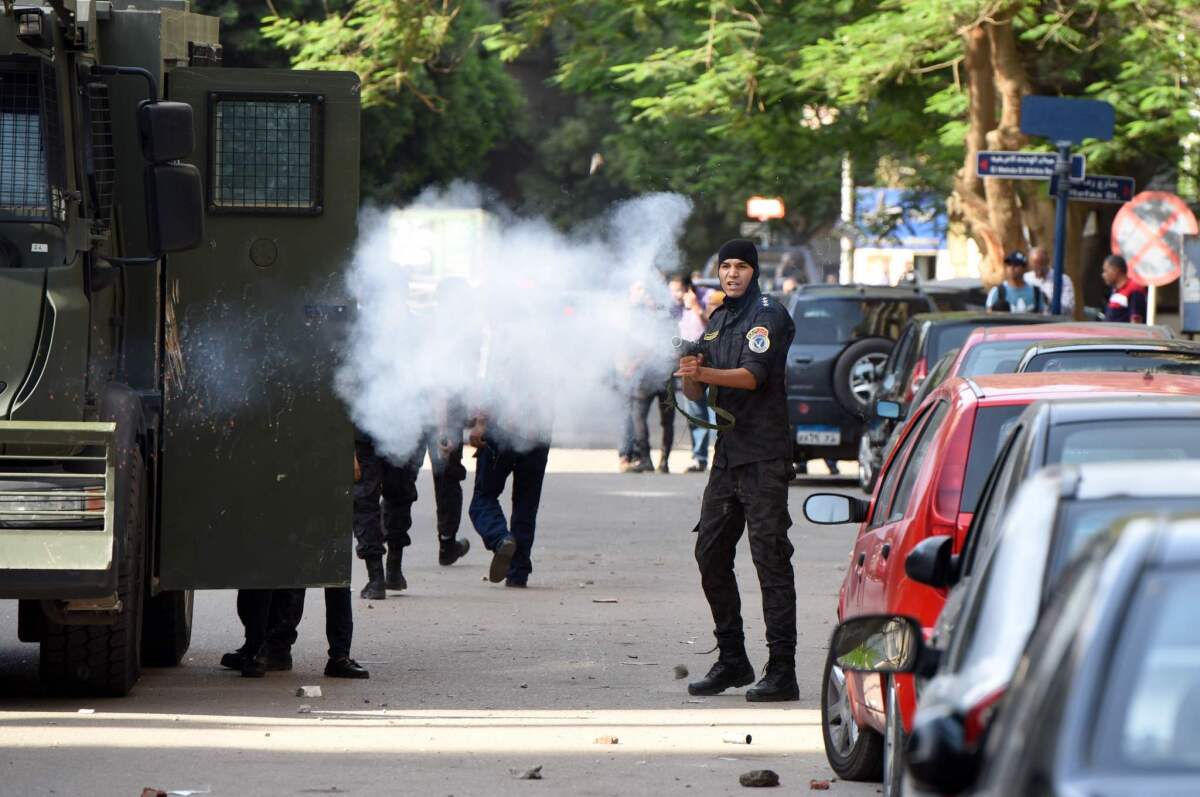Scores arrested as Egyptian security forces try to preempt demonstration

Egyptian riot police fire tear gas toward would-be protesters Monday.
- Share via
Reporting from CAIRO — Scores of people were arrested at cafes, metro stations and checkpoints as Egyptian security forces sought to head off a planned demonstration Monday over the government’s decision to surrender control of two islands in the Red Sea to neighboring Saudi Arabia.
Army forces were assigned to secure public buildings across Cairo, while scores of police checkpoints were erected to prevent protesters from assembling. The train station leading to Tahrir Square — the epicenter of Egypt’s uprising in 2011 — was closed.
The demonstration had been planned by a coalition of political groups and activists who urged Egyptians to take to the streets Monday to protest “giving up on Egyptian soil and commemorate the lives of those who died while defending the two islands.”
As police forces tightened security throughout Cairo on Monday, others celebrated. Monday was a public holiday in Egypt that commemorates the liberation of Sinai after Israel’s occupation of the peninsula in 1967.
The crackdown, which spanned four days as security forces moved through the city, was probably in response to streets protests this month. Thousands had gathered in what is believed to be the largest demonstration against President Abdel Fattah Sisi’s administration since he was elected in 2014, one year after the army-led ouster of then-President Mohamed Morsi.
In contrast, Monday’s planned demonstration was easily repelled by police forces in Cairo.
“Today was a good day for the government … authorities took urgent precautions and were one step ahead of protesters by closing down areas where people were meant to gather,” said Mustafa Labbad, director of Al Sharq Center for Regional and Strategic Studies in Cairo.
“However, this does not mean that the public anger against ceding the islands will fade away,” he added.
Egyptian and Saudi authorities say that the islands of Tiran and Sanafir belong to Saudi Arabia, and had been under Egyptian administration only because of a formal Saudi request for help protecting the islands in 1950.
The effort to contain a second wave of protests over the islands was designed to be swift and forceful, government officials said.
On Sunday, the Interior Ministry announced that it would “confront with the utmost decisiveness and resolution any acts that could infringe [on] public security,” adding that it “will use all force to deal with any attempt to assault vital, important facilities or harm police utilities.”
According to a statement issued by 17 Egyptian human rights organizations, at least 90 people were detained during the sweeps. The groups described the crackdown as an effort “to intimidate the public.”
“Police have arrested young people from cafes in downtown Cairo, at metro stations, at random police checkpoints and from their homes. Lawyers tracking the arrests say that the number of arrests is expected to increase in the coming hours given the longer list of arrest warrants they have seen on prosecutors’ desks,” the statement read.
A number of passersby on Monday were searched by police officers in downtown Cairo and scores of suspected would-be demonstrators were arrested before being released later in the day. Police closed the road leading to the Journalists Syndicate headquarters, the site of one of the largest gatherings during the April 15 protests.
In a speech commemorating Sinai Liberation Day, President Sisi said that “it is the responsibility of the civil police and armed forces to confront attempts to alarm citizen security by those attempting to affect [Egypt’s] security and stability.”
Whereas recurrent problems such as poverty, human and social rights failed to mobilize mass protests against Sisi, the islands’ crisis came to detract from the ruling government’s legitimacy, analyst Labbad said.
“It is a national issue that worked as a catalyst to bring political movements together. The debate is still ongoing and the parliament still has to approve the new maritime borders deal with Saudi,” he said.
Hassan is a special correspondent.
More to Read
Sign up for Essential California
The most important California stories and recommendations in your inbox every morning.
You may occasionally receive promotional content from the Los Angeles Times.










